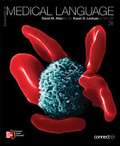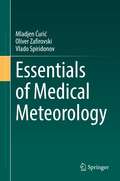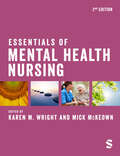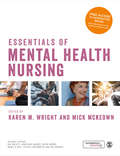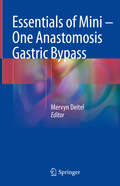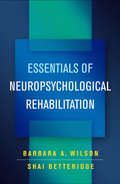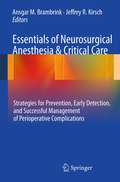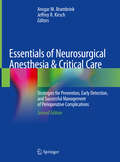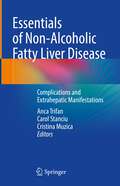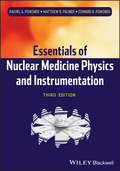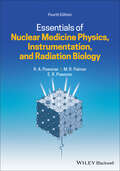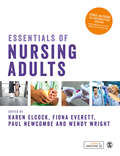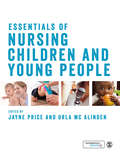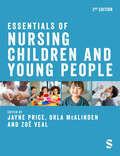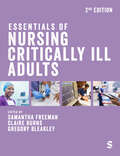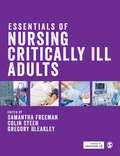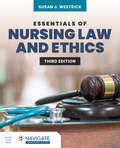- Table View
- List View
Essentials of Medical Language (2nd Edition)
by David M. Allan Karen D. LockyerThis book presents new medical terminology to students in manageable quantities via short lessons and a 2-page spread format. This edition offers a completely redesigned learning experience through larger, more focused art and revised table of contents.
Essentials of Medical Meteorology
by Vlado Spiridonov Mladjen Ćurić Oliver ZafirovskiThis book discusses the impacts that weather and climate have on human physical health, longevity, and mental wellness, and acts as a guide to the application of meteorological science in health care. It provides a background on biometeorology by covering basic concepts of human anatomy and meteorology, and how modern biometeorological science can be incorporated into medical practice through diagnosis, prevention and treatment of physical and mental diseases. The recommendations, advice and preventive measures addressed in this book aim to help people adapt to different weather phenomena and changes to minimize negative health consequences, which is increasingly relevant as climate change and its effects on human health become more pronounced and studied. The book is intended for environmental epidemiologists, medical students, physicians, health care providers, climate scientists, insurance industries and policy makers, but will also appeal to general enthusiasts of atmospheric, climate and medical sciences.
Essentials of Mental Health Nursing
by Karen M. Wright Mick McKeownAre you studying mental health nursing and want a book that covers all you need to know? Look no further. As it says in the name, this is an essential text for students. Split into 5 parts, this book delves into the context of mental health, key concepts and debates, skills for care and therapeutic approaches, tailoring care to people with specific needs, and transition to practice. Updated to include more content from those with lived experience, this new edition also includes: - Voices of mental health service users and practitioners, giving you a real insight in the field - Critical thinking stop points and debates, allowing you to develop your wider skills and knowledge - Case studies to bring the content to life - Chapter summaries, so you know what the main takeaways are for each chapter - Further reading and useful websites, allowing you to do your own research The editors, Karen M. Wright and Mick McKeown come with a wealth of experience in mental health nursing. The variety of contributors also reflect different experiences in different contexts.
Essentials of Mental Health Nursing
by Karen M. Wright Mick McKeownAre you studying mental health nursing and want a book that covers all you need to know? Look no further. As it says in the name, this is an essential text for students. Split into 5 parts, this book delves into the context of mental health, key concepts and debates, skills for care and therapeutic approaches, tailoring care to people with specific needs, and transition to practice. Updated to include more content from those with lived experience, this new edition also includes: - Voices of mental health service users and practitioners, giving you a real insight in the field - Critical thinking stop points and debates, allowing you to develop your wider skills and knowledge - Case studies to bring the content to life - Chapter summaries, so you know what the main takeaways are for each chapter - Further reading and useful websites, allowing you to do your own research The editors, Karen M. Wright and Mick McKeown come with a wealth of experience in mental health nursing. The variety of contributors also reflect different experiences in different contexts.
Essentials of Mental Health Nursing
by Karen Wright Reader Mick McKeownThis ground-breaking textbook gathers contributions from service users, expert practitioners and leading academics to help students develop the core knowledge and skills they need to qualify as mental health nurses. Focusing in particular on helping students apply person-centred, compassionate and recovery-focused care, service-user voices and practical case studies are integrated throughout the book. Students are also given a rounded understanding of the key debates they will face in practice through the exploration of both bio-medical and psycho-social approaches. Key features include: Voices and case studies from real practising nurses and students help students apply knowledge to practice. Critical thinking activities, debates, and ‘What’s the Evidence’ summaries help students develop higher level critical thinking and evidence based practice skills. Further reading and free SAGE journal articles facilitate independent learning. Online MCQs and Flashcards make revision simple and fun. The free interactive ebook gives students the freedom to learn anywhere! Online Lecturer resources: free MCQs, video debates, SAGE journal articles and more, which can be used for flipped classroom activities or lectures to make teaching more interactive.
Essentials of Mental Health Nursing
by Karen Wright Reader Mick McKeownThis ground-breaking textbook gathers contributions from service users, expert practitioners and leading academics to help students develop the core knowledge and skills they need to qualify as mental health nurses. Focusing in particular on helping students apply person-centred, compassionate and recovery-focused care, service-user voices and practical case studies are integrated throughout the book. Students are also given a rounded understanding of the key debates they will face in practice through the exploration of both bio-medical and psycho-social approaches. Key features include: Voices and case studies from real practising nurses and students help students apply knowledge to practice. Critical thinking activities, debates, and ‘What’s the Evidence’ summaries help students develop higher level critical thinking and evidence based practice skills. Further reading and free SAGE journal articles facilitate independent learning. Online MCQs and Flashcards make revision simple and fun. The free interactive ebook gives students the freedom to learn anywhere! Online Lecturer resources: free MCQs, video debates, SAGE journal articles and more, which can be used for flipped classroom activities or lectures to make teaching more interactive.
Essentials of Mesenchymal Stem Cell Biology and Its Clinical Translation
by Robert Chunhua ZhaoMesenchymal stem cells (MSCs), a type of adult stem cells, have attracted the attention of scientists and physicians alike due to their unique biological properties and potential for disease treatment. As stem cell research is complex and progressing rapidly, it is important that the experts in this field share their views and perspectives. This book, co-edited by leading global researchers, is divided into three major sections and covers a broad range of topics concerning MSCs during their transition from benchside to bedside. The book is intended for researchers and clinicians in the field of stem cells. Dr. Robert Chunhua Zhao, MD. Ph.D is Cheung Kong Professor of Stem Cell Biology, Professor of Cell Biology at the Institute of Basic Medical Sciences & School of Basic Medicine, Chinese Academy of Medical Sciences & Peking Union Medical College, China Director of Center for Tissue Engineering, PUMC Chief scientist of 973 program Regional Editor of Stem Cells and Development.
Essentials of Mini ‒ One Anastomosis Gastric Bypass
by Mervyn DeitelThis book indicates the technique and fine points of the mini- and one-anastomosis gastric bypass, and looks at the means of revising other operations related to it. The chapters discuss postoperative complications, treatment and requirements, postoperative diet and medications, the remarkable effects on the co-morbidities of morbid obesity, and the durability of the weight loss, as well as the improvement in the quality of life.Essentials of Mini ‒ One Anastomosis Gastric Bypass aims to help surgeons manage the difficulties encountered within this procedure and to help create improved practice.
Essentials of Neuropsychological Rehabilitation
by Barbara A. Wilson Shai BetteridgeFor people with disabilities caused by nonprogressive brain injury, challenges in everyday living can be multifaceted and overwhelming. This book presents key principles of holistic neuropsychological rehabilitation, helping practitioners stay on track through complex terrain. Leading authorities Barbara A. Wilson and Shai Betteridge provide a framework for effective intervention based on a collaborative understanding of clients' strengths and needs. They describe essential strategies for assessing and remediating the impact of cognitive and psychosocial problems in everyday life. Detailed case examples illustrate the process of building partnerships with families, setting meaningful goals, developing skills and supports, and addressing emotional and mental health concerns. Innovative uses of technology are highlighted. Several reproducible clinical tools can be downloaded and printed in a convenient 8 1/2" x 11" size.
Essentials of Neurosurgical Anesthesia & Critical Care
by Jeffrey R. Kirsch Ansgar M. BrambrinkThis handbook is aimed at first-line health care providers involved in the perioperative care of adult and pediatric neurosurgical patients. It is unique in its systematic focus on how to deal with common and important clinical challenges encountered in day-to-day practice in the OR, the PACU, and the ICU and is designed as a problem-solving tool for all members of the perioperative medicine team: trainees and faculty in anesthesiology, neurosurgery, and critical care; nurses; nurse anesthetists; and physician's assistants. * Encompasses clinical continuum from neurosurgical pre-op to critical care - plus anesthesia in neuroradiology * Adult and pediatric care * Structured algorithmic approach supports clinical decision-making * Succinct presentation of clinically relevant basic science * End-of-chapter summaries, with suggestions for further reading * Collaborative approach and multidisciplinary nature of perioperative medicine emphasized * Extensive summary tables * Portable and formatted for quick retrieval of information * Ideal for use in the OR, the PACU, and the ICU
Essentials of Neurosurgical Anesthesia & Critical Care: Strategies for Prevention, Early Detection, and Successful Management of Perioperative Complications (Lecture Notes In Physics #Vol. 109)
by Jeffrey R. Kirsch Ansgar M. BrambrinkThis comprehensive, evidence-based book is intended to serve as a reference for medical practitioners involved in the perioperative care of neurosurgical patients. Fundamental aspects of neuroanesthesiology and neurocritical care are thoroughly examined across 101 chapters, outlining key elements that are crucial to a care provider’s knowledge of the practice. These elements include specific diagnostic procedures and treatment options, concepts and applicable details of the available neurosurgical interventions and techniques, and mechanisms necessary to provide top of the line care for patients. Each chapter features definitive and distinct areas of this multi-specialty discipline, and is designed to guide the reader from problem to solution in situations that can arise in the clinical setting.Essentials of Neurosurgical Anesthesia & Critical Care, 2nd edition is a problem-oriented approach textbook that will aid a wide variety of readers in handling day-to-day issues and developments relevant to the perioperative care of neurosurgical patients.
Essentials of Non-Alcoholic Fatty Liver Disease: Complications and Extrahepatic Manifestations
by Anca Trifan Carol Stanciu Cristina MuzicaThe book is a compact yet comprehensive practical resource that highlights all must-know information on non-alcoholic fatty liver disease (NAFLD). Covering the major issues dominating the field, this book offers a broad vision on NAFLD using key data for a deep and thorough understanding of the latest diagnostic methods, treatment options, potential complications, and disease management strategies to improve patient outcomes. The volume bridges the trans-disciplinary divide between hepatologists, cardiologists, nephrologists, psychiatrists, oncologists and dermatologists in order to cover the complex management of NAFLD in a single volume. It operates under a modern definition of NAFLD that acknowledges the range of presentations related to extrahepatic complications that hepatologists see in daily practice, while also delving into unanswered questions and future directions regarding treatment options. Offering practical, clinical guidance in addition to capturing the new promising therapeutic approaches in the pipeline, this book is an essential reference for clinicians, researchers and students.
Essentials of Nuclear Medicine Physics and Instrumentation
by Edward R. Powsner Matthew R. Palmer Rachel A. PowsnerAn excellent introduction to the basic concepts of nuclear medicine physics This Third Edition of Essentials of Nuclear Medicine Physics and Instrumentation expands the finely developed illustrated review and introductory guide to nuclear medicine physics and instrumentation. Along with simple, progressive, highly illustrated topics, the authors present nuclear medicine-related physics and engineering concepts clearly and concisely. Included in the text are introductory chapters on relevant atomic structure, methods of radionuclide production, and the interaction of radiation with matter. Further, the text discusses the basic function of the components of scintillation and non-scintillation detector systems. An information technology section discusses PACs and DICOM. There is extensive coverage of quality control procedures, followed by updated chapters on radiation safety practices, radiation biology, and management of radiation accident victims. Clear and concise, this new edition of Essentials of Nuclear Medicine Physics and Instrumentation offers readers: Four new chapters Updated coverage of CT and hybrid scanning systems: PET/CT and SPECT/CT Fresh discussions of the latest technology based on solid state detectors and new scanner designs optimized for dedicated cardiac imaging New coverage of PACs and DICOM systems Expanded coverage of image reconstruction and processing techniques New material on methods of image display Logically structured and clearly written, this is the book of choice for anyone entering the field of nuclear medicine, including nuclear medicine residents and fellows, cardiac nuclear medicine fellows, and nuclear medicine technology students. It is also a handy quick-reference guide for those already working in the field of nuclear physics.
Essentials of Nuclear Medicine Physics, Instrumentation, and Radiation Biology
by Edward R. Powsner Matthew R. Palmer Rachel A. PowsnerMANAGING THE GLOBAL WORKFORCE In today’s highly competitive global business environment, organizations need to aggressively compete for new markets, products, services, and top human talent in order to develop and sustain competitive advantage in the global arena. For many years, international firms have effectively managed their financial and material resources globally, leveraging economies of scale, low cost production, currency fluctuations, and the like. Human resources, as all other resources in multinational firms, are now being managed on a global scale. In our ever-increasing knowledge economy, winning in the global arena will largely depend on how well firms can leverage, attract, develop, engage and motivate the strategic capabilities of their human talent globally
Essentials of Nursing Adults
by Karen Elcock Paul Newcombe Wendy Wright Fiona EverettDrawing together the best of text, video and interactive material for the definite guide to adult nursing. This one-stop-shop will enable students to understand the core aspects of care, learn the essential nursing skills and knowledge that underpin practice, deal with the complexities of the role and apply their learning to common conditions and patient groups. It has been developed in line with the 2018 NMC standards to provide a complete learning resource for adult nursing students. Key features Blends the best of print and online learning with a companion website for further study and 12 months free access to an electronic version of the book further bringing the material to life. Uses patient centred care and evidence-based practice as guiding principles throughout Clear and engaging features help students to understand the core theory and knowledge, apply it nursing practice, go further in their independent study and revise for assessments and exams. Designed to make learning flexible and fun leaving students better prepared for practice and ready to thrive in their future careers.
Essentials of Nursing Adults
by Karen Elcock Paul Newcombe Wendy Wright Fiona EverettDrawing together the best of text, video and interactive material for the definite guide to adult nursing. This one-stop-shop will enable students to understand the core aspects of care, learn the essential nursing skills and knowledge that underpin practice, deal with the complexities of the role and apply their learning to common conditions and patient groups. It has been developed in line with the 2018 NMC standards to provide a complete learning resource for adult nursing students. Key features Blends the best of print and online learning with a companion website for further study and 12 months free access to an electronic version of the book further bringing the material to life. Uses patient centred care and evidence-based practice as guiding principles throughout Clear and engaging features help students to understand the core theory and knowledge, apply it nursing practice, go further in their independent study and revise for assessments and exams. Designed to make learning flexible and fun leaving students better prepared for practice and ready to thrive in their future careers.
Essentials of Nursing Children and Young People
by Jayne Price Orla Mc AlindenThis innovative and student-friendly textbook provides up-to-date information on the core content of child nursing courses and helps students understand how it applies to practice. Covering all settings throughout, including the acute and community ones, it focuses on the importance of child and family centred care, by having them directly involved through the use of voices and case studies. This book provides a comprehensive framework for student knowledge development by including: Activities and theory stop-points to encourage students to develop their critical thinking skills Pointers to further reading resources, including journal articles and videos for students to explore and build knowledge more independently A range of online resources including extra scenarios for lecturers to use in their teaching and MCQs for students to revise. This is essential reading for undergraduate nursing students specialising or wanting to specialise in children and young people nursing.
Essentials of Nursing Children and Young People
by Jayne Price Orla Mc AlindenThis innovative and student-friendly textbook provides up-to-date information on the core content of child nursing courses and helps students understand how it applies to practice. Covering all settings throughout, including the acute and community ones, it focuses on the importance of child and family centred care, by having them directly involved through the use of voices and case studies. This book provides a comprehensive framework for student knowledge development by including: Activities and theory stop-points to encourage students to develop their critical thinking skills Pointers to further reading resources, including journal articles and videos for students to explore and build knowledge more independently A range of online resources including extra scenarios for lecturers to use in their teaching and MCQs for students to revise. This is essential reading for undergraduate nursing students specialising or wanting to specialise in children and young people nursing.
Essentials of Nursing Children and Young People
by Jayne Price Orla McAlinden Zoë VealThis book is a one-stop shop for the vast majority of children and young people′s nursing students. The editors for the new edition are Jayne Price from Kingston University, Orla McAlinden previously from Queen′s University Belfast, and Zoë Veal from UWE Bristol, all with vast experience in nursing children and young people. A high level of research has gone into developing and refining the key features for this edition, such as updated voices and implementing new NMC standards. This book maps to the content of the majority of pre-registration child nursing programmes, and by adopting a 5 part structure it clearly covers the core parts of training and practice that you will need: Part 1): Principles of nursing children and young people Part 2): Wellbeing and development Part 3): Caring for children and young people with acute health care needs and injury Part 4): Caring for children and young people with complex and high dependency needs Part 5): Being a professional children and young people′s nurse
Essentials of Nursing Children and Young People
by Jayne Price Orla McAlinden Zoë VealThis book is a one-stop shop for the vast majority of children and young people′s nursing students. The editors for the new edition are Jayne Price from Kingston University, Orla McAlinden previously from Queen′s University Belfast, and Zoë Veal from UWE Bristol, all with vast experience in nursing children and young people. A high level of research has gone into developing and refining the key features for this edition, such as updated voices and implementing new NMC standards. This book maps to the content of the majority of pre-registration child nursing programmes, and by adopting a 5 part structure it clearly covers the core parts of training and practice that you will need: Part 1): Principles of nursing children and young people Part 2): Wellbeing and development Part 3): Caring for children and young people with acute health care needs and injury Part 4): Caring for children and young people with complex and high dependency needs Part 5): Being a professional children and young people′s nurse
Essentials of Nursing Critically Ill Adults
by Samantha Freeman Gregory Bleakley Claire BurnsFully updated in line with contemporary policy and practice, the second edition introduces core aspects of critical care – from infection prevention and control to psychological care – before introducing critical care as it relates to the pathophysiology of different systems of the body. The book is packed full of practical learning features that have been specially designed to enhance your knowledge and test your understanding, including: • Clinical case studies • Theory stop points • Critical thinking tasks • Reflective practice exercises Written by a dedicated team of lecturers and practitioners with extensive experience in critical care nursing, this essential guide will equip you with the skills and confidence needed to succeed in a critical care environment. Ideal for nursing students studying critical care, those undertaking clinical placements in intensive care settings, or for nurses new to the critical care environment. Lecturers and instructors can go online to access a testbank of multiple-choice questions and links to relevant videos for each chapter, as well as PowerPoints for each chapter that can be downloaded and customised as needed.
Essentials of Nursing Critically Ill Adults
by Samantha Freeman Gregory Bleakley Claire BurnsFully updated in line with contemporary policy and practice, the second edition introduces core aspects of critical care – from infection prevention and control to psychological care – before introducing critical care as it relates to the pathophysiology of different systems of the body. The book is packed full of practical learning features that have been specially designed to enhance your knowledge and test your understanding, including: • Clinical case studies • Theory stop points • Critical thinking tasks • Reflective practice exercises Written by a dedicated team of lecturers and practitioners with extensive experience in critical care nursing, this essential guide will equip you with the skills and confidence needed to succeed in a critical care environment. Ideal for nursing students studying critical care, those undertaking clinical placements in intensive care settings, or for nurses new to the critical care environment. Lecturers and instructors can go online to access a testbank of multiple-choice questions and links to relevant videos for each chapter, as well as PowerPoints for each chapter that can be downloaded and customised as needed.
Essentials of Nursing Critically Ill Adults
by Samantha Freeman Colin Steen Gregory BleakleyAn essential guide to critical care nursing that includes all the key scientific knowledge and procedures you will need to know when entering the critical care environment. Written by a dedicated team of lecturers and practitioners with extensive experience in critical care nursing, this textbook covers all the key elements involved in nursing critically ill adults, with individual chapters on managing problems associated with different organ systems and the pathophysiology behind these disorders. It also features coverage of psychological care and infection prevention, and includes a consistent focus on the importance of a person centred, evidence-based approach to critical care delivery. To further support your learning, the book is full of activities that enhance your knowledge and test your understanding, including clinical case studies, critical thinking tasks, and reflective practice exercises. For lecturers and instructors, there is a collection of online resources including a testbank of multiple-choice questions, links to relevant videos for each chapter, and PowerPoint slides for each chapter. The ideal textbook for nursing students studying critical care, undertaking clinical placements in intensive care, or nurses new to the critical care environment.
Essentials of Nursing Critically Ill Adults
by Samantha Freeman Colin Steen Gregory BleakleyAn essential guide to critical care nursing that includes all the key scientific knowledge and procedures you will need to know when entering the critical care environment. Written by a dedicated team of lecturers and practitioners with extensive experience in critical care nursing, this textbook covers all the key elements involved in nursing critically ill adults, with individual chapters on managing problems associated with different organ systems and the pathophysiology behind these disorders. It also features coverage of psychological care and infection prevention, and includes a consistent focus on the importance of a person centred, evidence-based approach to critical care delivery. To further support your learning, the book is full of activities that enhance your knowledge and test your understanding, including clinical case studies, critical thinking tasks, and reflective practice exercises. For lecturers and instructors, there is a collection of online resources including a testbank of multiple-choice questions, links to relevant videos for each chapter, and PowerPoint slides for each chapter. The ideal textbook for nursing students studying critical care, undertaking clinical placements in intensive care, or nurses new to the critical care environment.
Essentials of Nursing Law and Ethics
by Susan J. WestrickEssentials of Nursing Law and Ethics continues its focus on the legal aspects of Nursing as it relates to patient safety and quality, environmental health and safety, error reduction and ethical boundaries of practice in an updated third edition. Written by a nurse attorney, this unique text presents complex topics to undergraduate nursing students in an understandable manner while providing accurate and well researched content relevant to nursing practice. The Third Edition was thoughtfully revised and updated to incorporate gender neutral, inclusive, patient-centered and person-first language throughout. Furthermore, it features new and updated case law examples and updated coverage of timely topics, including documentation, patient teaching, confidentiality, end of life issues, advance directives, refusing a patient assignment, sexual harassment in the workplace, use of social media by nurses, error reduction/disclosure, correctional nursing, age discrimination, the ADA, and more.
